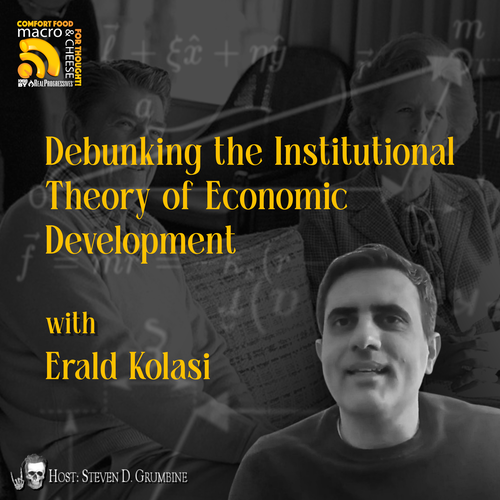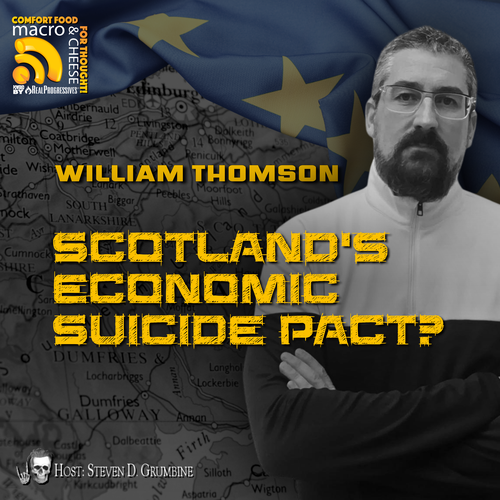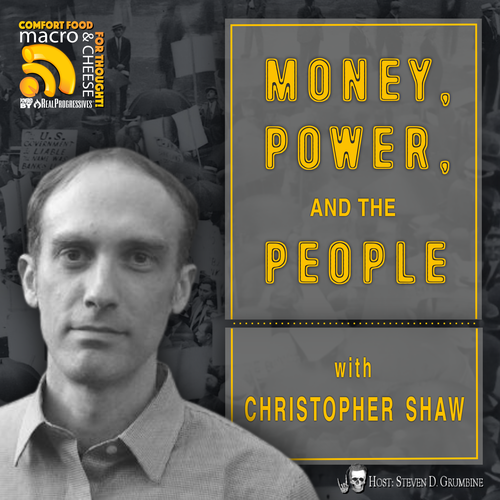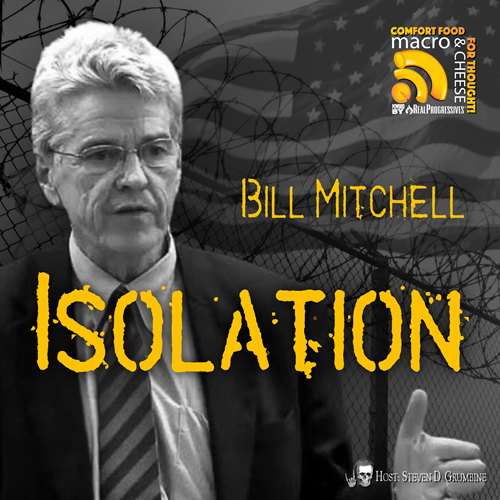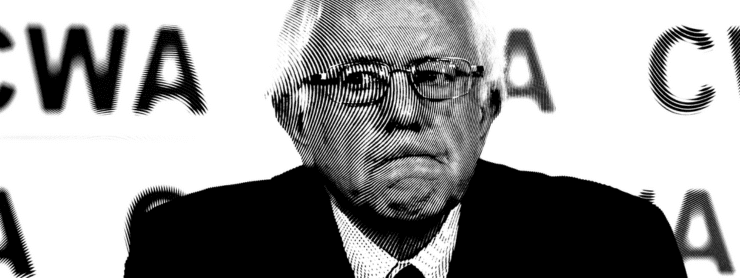Episode 8 – Across the Pond MMT in the UK with Patricia Pino

FOLLOW THE SHOW
Patricia Pino, host of the UK’s MMT Podcast, untangles the confusing politics of Brexit and explains how the Eurozone furthers the neoliberal agenda. With MMT, the UK’s citizens can control their own destiny.
Steve’s guest, straight from the UK, is Patricia Pino, a founder of the Gower Institute for Modern Money Studies and host of the MMT Podcast. The topic of the day is Brexit, and Patricia explains why it can be as confusing to citizens of the UK as it is to those of us on the outside. Understanding how the Eurozone furthers the neoliberal agenda goes a long way toward untangling the political posturing and mainstream media coverage. With MMT, the UK can avoid Brexit’s pitfalls and control their own fate.
@PatriciaNPino on Twitter
The MMT Podcast – pileusmmt.libsyn.com/
The Gower Initiative for Modern Money Studies – gimms.org.uk/
Special Thanks to Geoffrey Ginter for the excellent intro song! And of course special thanks to our guest Patricia Pino, the donors of Real Progressives and our excellent staff of volunteers.
Macro N Cheese – Episode 8
Across the Pond MMT in the UK with Patricia Pino
March 3, 2019
Patricia Pino [intro/music] (00:02):
To vote to leave still felt like a vote for Farage and still felt like a vote for racism and xenophobia. So it was really difficult to stomach a leave vote, even though I had my doubts about whether remain was the right choice.
Patricia Pino [intro/music] (00:20):
Fadhel Kaboub was absolutely amazing. That particular episode on the job guarantee that he did has been shared so much. I’ve even sent it to members of parliament here for them to learn more about the job guarantee. I hope they’re listening to it because it’s great.
Geoff Ginter [intro/music] (00:46):
Now let’s see if we can avoid the apocalypse altogether. Here’s another episode of Macro N Cheese with your host, Steve Grumbine.
Steve Grumbine (01:34):
Alright, friends. Welcome. It’s Steve Grumbine with Real Progressives. Going across the pond over to the UK where I will be bringing on my friend, Patricia Pino. You all have seen her writing in The Pileus. She’s been on the show before. We’re going to be talking all about Brexit, the EU and monetary sovereignty. So without further ado, let me bring on my guest, Patty Pino, welcome to the show. How are you?
Pino (02:01):
Not too bad.
Grumbine (02:02):
So one of the things that, you know, we, you’ve heard what we’ve done around here, so this should come as no shock. You know, we talk Modern Monetary Theory, you talk Modern Monetary Theory, but in the EU, things are very, very different than in the sovereign, monetarily sovereign nation, such as the UK and the US.
Can you explain to us a little bit about what the EU and the Eurozone and all the different components of what that block of states actually is made up of and what the rules and regs are a little bit, give us an overview?
Pino (02:38):
Well that’s part of the problem that not many people really understand all the intricacies of how the EU works and how it’s composed, et cetera. I mean, whole books have been written on the subject. But in very, very quick, simple terms, you have 28 nations which conform to EU and with, and those 28 nations have some treaties about a single market, trade, et cetera.
Within those 28 nations, you also have a number of nations. I can’t remember exactly how many who are part of the Eurozone and they have a different set of structure within the main EU structure, which works slightly different, but they also share some treaties.
And then you have countries like Norway, which have a slightly different arrangements with the EU and some things apply to them and some things don’t apply to them. So, the UK, for example, we retained our currency. So we still use the pound and we retained, we are not, also, we’re not within the Schengen area, which is why people have to apply for a separate visa when they come to Britain.
And so that makes a big difference because having kept control over our currency, it means that some things, for example, the EU, as one of the regulations that is very much criticized which is in the Maastricht Treaty, is about restricting the 3% deficit. And that’s what we’ve been hearing a lot about in Italy, about Italy and Greece, et cetera. That applies as well to the UK.
However, because the UK has its own currency, all the EU can basically do is ask politely that we put our deficit down and ask us for a plan as to how we’re going to put it deficit down, but it’s not as easy for them to enforce those rules in the UK, as it is to impose them in countries like Italy and Greece.
So it is a big complicated mess and a lot of the instability and a lot of the pain that is being caused at the moment in the UK is because not, people are in disagreement as to what the treat is actually mean.
Grumbine (04:52):
Okay. So when we talk about Brexit, for example, you know, there was a lot of talk about, you know, being racist and being all about, you know, these hard right xenophobes and so forth. And I know that had a part of why people left. But there was a far greater rationale behind Brexit than just the knee jerk identity politics that tends to be the pop narrative that goes around.
Talk a little bit about why the UK left and what that was all about. Just because I don’t think people really have a clue what that was about. They just heard somebody tell some story somewhere and they’ve repeated it and that’s about the extent of it.
Pino (05:33):
I think, I think, yeah, people make the mistake of saying, oh, everybody who voted “leave” voted for this reason. And everybody who voted “remain” voted for this reason. When, in fact, within those two groups there is quite, you know, a wide range of views and there are left, left-wingers and right-wingers within both groups.
The issue is that even though in the left there has always been a tradition where, you know, they’ve always there, there’s always been a part of the left which has been against the EU from its inception, including people like Tony Benn and, of course, Jeremy Corbyn. The Blair right part of the Labour party and, then, the liberal part of the Labour party were almost pro EU.
The more recent part of the Labour party have been largely pro EU. And they, I, I mean, it’s difficult to say what happened behind closed doors, but I think that at some point they persuaded Jeremy Corbyn to drop the EU off his agenda. Even people voted for him, despite the fact that they knew he was against the EU, including myself and, but at some point he got persuaded to drop that.
And then you got on the, on the right of the spectrum, of course, you’ve got the liberal rights, people like David Cameron and Osborne, et cetera, who were massively pro EU, and then you have this xenophobic and the racist parts of the right wing what you would call populous parts of the right wing spectrum.
And you have people like Nigel Farage who used, you know, who tried to divide society and use that as a means to, who always was campaigning against the EU on the basis of, primarily, immigration. And so you have those two camps and the issue is that during the referendum campaign, the left was pretty much entirely absent from the media.
The media did not pay attention to the debate that was going on in the left, even though it was happening because I was involved in it, especially on social media. All they focused on was Farage against, you know, the likes of David Cameron. So all they focused on was the debate that the two sections of the right were having.
So it was all about the argument became simplified into your idea, you either hate immigrants and don’t care about the economics and, you know, will destroy the economics of the country in order to, in your hatred of immigrants or you do what’s sensible and follow, you know, and do what economists are telling you to do because, you know, economists know what they’re talking about and do the safe thing and stay in the EU, et cetera.
So it became polarized and it became an issue of identity. And I would be lying if I said that that didn’t have an influence on my vote even though I’m no stranger to the shortcomings of the EU, it still felt – to vote to leave – still felt like a vote for Farage and still felt like a vote for racism and xenophobia.
So it was really difficult to stomach a “leave” vote, even though I had my doubts about whether “remain” was the right choice. So a lot of people did that.
And I think that’s part of the reason it was such a shock when it happened, because to the country, to most of the country, to the liberal part of the country, especially to London, which is where I live, it represented the success of the far right. And, you know, that the murder of the MP Jo Cox was the worst part of it during the campaign.
Grumbine (09:21):
So when you, when you think to yourself about why, you know, the narrative right now is largely simply trying to place all the onus on the bigotry, if you will, the xenophobia, is the narrative that MMT presents that far outside the mainstream? Is it that far beyond people?
I mean, I know Simon Wren-Lewis has no interest whatsoever in it, but where in the world do they come up with the economic narrative that brings up this 3% deficit? And where is it, it seems so far fetched that anybody with any reasonable understanding of economics would stand on this.
Why do you think, is this just how pervasive neoliberalism is in this arena? I mean, it is that bad in the US for sure, but it is changing. It seems like it’s starting to change in the UK ever so slightly. Is that really, though, what it is? Is this neoliberalism?
Pino (10:25):
I mean, that 3% figure in the EU which is the deficit restriction, I think, as far as I know, it was plucked from thin air. It was somebody said, oh, 3%, you know, and that’s how it’s been ever since. No consideration was ever given to the needs of a nation or, you know, or the different economies, because it was assumed that, you know, the priority is to reduce your debt because that’s neoliberalism, that’s what neoliberalism tells you.
And so I think people, most people who voted to “remain” in this country, most of them, not surprisingly, have spent most of their lives within the neoliberal era, in which, you know, the last four decades. And most of them have been, grown up with this idea that free trade is good. You know, it’s free. It must be good.
And, you know, there’s this sense that anything that we do to eliminate borders or anything we do to become more like that, you know, John Lennon ideal of no nationalities, et cetera, is good. And the EU was sold to them as a means of integration, you know, and it was sold to a lot of people as a means to integration and, yeah, to some degree it’s difficult, it’s difficult to disagree.
Yeah, you know, all these things are good. Integration is good. Collaboration is good. Of course, you know, one of the aspects that really hurt me about the referendum was the fact by then the European space agency had just had an incredible success with the, that satellite that landed in the comet. And to me, you know, that was achieved through collaboration of countries.
And right now all, we don’t know what’s going to happen to the European space agency but it seems like we’re not going to be able to collaborate as well as we used to. But the issue is that what the powers that be told people that the EU was going to be about, is not what it was ultimately about.
I think they were sold this image of integration and collaboration when actually what they wanted to do was remove accountable power from governments. So in the EU you have this really interesting thing where in a country like Italy, you have the national government who supposedly control fiscal policy.
And then you have the ECB and the European commission who restrict or put certain rules which restricts the laws of Italy. However, when things go wrong in Italy, we are expected to hold it, you know, to hold the Italian government to account. But the Italian government is rightly pointing to the, to the limitations that it has at European level.
And then you have the situation where you don’t know who is to blame. You don’t have anybody who’s fully accountable for anything. And that’s a problem because it makes it very easy for outsiders or external influences to then dictate policy, you know, at European level or influence policy at European level, like we had with TTIP and Greece.
And, at the same time, you know, this all happens behind the scenes and nobody really understands what the relationship is between the European central bank and national governments or the level of responsibility that each of them have over the well-being of a particular country.
Intermission (14:10):
You are listening to Macro N Cheese, a podcast, brought to you by Real Progressives, a nonprofit organization dedicated to teaching the masses about MMT or Modern Monetary Theory. Please help our efforts and become a monthly donor at PayPal or Patreon, like and follow our pages on Facebook and YouTube and follow us on Periscope, Twitter, and Instagram.
Grumbine (14:59):
You know, I watch your postings and, you know, some of the things that jump out at me, it’s quite obvious that there’s an incredible amount of boloney, really, just spread around amongst the economists, if you want to call them economists, I call them clerics or mystics. These folks out there that I see coming from the UK, there’s no one actually preaching anything useful.
There’s no one, when I read the stuff, that gives me any real hope. Who amongst the thought leaders in the UK and the Eurozone countries, et cetera, is, are there any economists out there that are speaking common sense or are they all wrapped up in the same nonsensical charade that seems to be the common narrative? Is there anyone fighting the narrative at all other than the MMTers?
Pino (15:50):
No, that’s the sad reality. And even, I mean, Richard Murphy, for example, he’s become an MMTer and a very good one over time. And he’s now, you know, one of the leading voices on it, but he’s still, as far as I know, he’s still very much pro-remain and he doesn’t challenge the narrative that’s come from, you know, from the other orthodox economists saying that, “Oh, when the UK leaves it’s going to be Armageddon and everybody’s going to die.”
And for example, one of the things that they’ve been saying is that as soon as the UK leaves, that’s going to bring GDP down, presumably because, you know, exports will collapse and we won’t be able to trade with anybody and, therefore, growth will fall. And that means that we’d be poorer and, therefore, we won’t be able to raise taxes to have public services.
And therefore, you know, the NHS will collapse, et cetera. And this narrative has been, I mean, it was quite prevalent, David Cameron and Osborne often use debt. But now we also see from Lib Dems, from liberals, but also within labour Blairites, et cetera, they hold onto that narrative.
And when you try, and when you try to say, “Well, no, I’m not, I’m not going to say that everything’s going to be okay and rosy because that largely depends on our government” – and unfortunately we have a rubbish government at the moment- but there’s nobody out there that says, “It’s really up to us.”
And the only person actually that came close to saying that was, actually, Jeremy Corbyn in one of his speeches, recently, where he said that you shouldn’t believe the people that say it’s going to be doom and gloom and you shouldn’t believe the people that offer the promise land either. It’s going to be somewhere in between and it’s really up to us.
But there’s really no, I mean, Steve Keen is a, understands the issues with the EU and understands a lot of what’s going on and yes, yes, he’s vocal. Yes, he’s vocal about it. I was going to be unfair no. He’s very vocal about it. I wish he was more prominent or he was, you know, in the media, in the mainstream media talking more about it. But he’s one of the few voices that really does, you know, fight for you on the corner on that.
Grumbine (18:15):
Okay. Very good. So we had Steve Keen and Warren Mosler on here a few weeks back, kind of duking it out over trade and the effects of trade on different countries and debt that, you know, comes as a result of that. And then the central banking transfers of money between, you know, trade partners, et cetera. And that was quite an interesting discussion to say the very least.
Alright, so let’s look now a little bit at your current situation with the publication you were with. It was The Pileus. I believe that there’s been some changes coming up. Did you want to talk about that?
Pino (18:56):
Yeah. I mean, we are undergoing a rebranding of The Pileus. I think we want to make our team bigger and expand from what we were doing. So we’ve got a name now called REKNR. We are still setting up the website and still, we’ve got a Twitter account. So if anybody would like to follow that from now, it’s @reknrmag on Twitter, which is spelled R E K N R.
Grumbine (19:26):
Very good.
Pino (19:26):
And then just to give you a heads up, we got Stephanie Kelton, a talk by Stephanie Kelton. I’m very excited about it because I’ve never met her before and it’s like, it’s like meeting Justin Bieber, you know. It’s amazing. Actually, it’s better than meeting Justin Bieber, but, yeah.
And we’ve got, there’s a group of us called the Gower Institute of Modern Money Studies as well, who are setting up a website and it’s going to be entirely educational, entirely pro job guarantee and trying to frame it from a UK perspective and economists like Bill Mitchell to try and help us launch that in the UK and have a bit more, few more MMTers, have a bit more influence in the political sphere here. But things are moving forward which is good.
Grumbine (20:19):
No, that is fantastic. All right, great. So let me ask you, you have a phenomenal podcast and I, Christian Reilly is great too. Tell us about your podcast, how it got started, you know, what you’ve done so far, because honestly I’ve listened to it and just amazing. You had Fadhel Kaboub on, who was with us as well. I mean, this is just phenomenal, great content. Tell us about your podcast.
Pino (20:49):
Well, it was actually Christian’s idea to have a podcast. I’m not much of a podcast person so I kind of went along with him on it from the start, and then I really had a lot of fun doing that interview that he asked me to do.
And so when we wanted to get more MMT going on the Pileus and start something more, you know, that he’s the first person I thought about, you know, having a regular thing, a regular conversation with people and being able to just, you know, he’s, I think his idea is, you know, somebody could be cooking dinner and, you know, listening and learning MMT at the same time, or, you know, going work and learning MMT.
And it was just the means to find a different way to reach people because not everybody has the chance to read through, you know, pages and pages and pages, et cetera. And, so yeah, it pulls a little bit for the last two or three weeks because of this rebranding thing. But we’ve got a couple more episodes at least that we need to release pretty soon.
And Fadhel Kaboub was absolutely amazing in it. And that particular episode on the job guarantee that he did has been shared so much. I’ve even sent it to members of parliament here for them to learn more about the job guarantee. I hope they’re listening to it because it’s great.
Grumbine (22:17):
That’s fantastic. So let me ask you one final question. You have done writing. You have done video. You have now done podcasting. You’re an engineer by trade, correct?
Pino (22:32):
Yeah, I am.
Grumbine (22:32):
I mean, you’re just like wearing 1,001 hats.
Pino (22:37):
Yeah.
Grumbine (22:39):
One of the things that makes MMT, to me, the most powerful is that, you know, regular people live life very scared. They’re very easily put off by things that they don’t understand. Modern Monetary Theory breaks down the things that we don’t understand and helps us so that we do understand them, so we can make better choices.
We can understand the world around us better and it allows us to understand how much boloney is being pumped out. And MMT is not exactly engineering, you know what I mean? How did you end up learning MMT?
Pino (23:20):
Well, it makes an awful lot of sense. It makes, it makes a lot more sense than any other version of economics, so to speak, that I come across. As an engineer, I’m not, I like things making sense and I’m not, I guess one thing I had going for me was that, you know, I’m not a stranger to, okay, getting down with the equations and actually understanding from first principles, something – that’s part of my job.
So I imagine, you know, to people who don’t do that for a living, people who are, don’t do much technical stuff for a living that might, you know, they might be a bit more rusty on that regard or might be, is asking more of them to sit down and actually look through that in detail. But I think it helped me learn through the economics to do that. But, you know, I read a lot of the stuff that other economists, orthodox economists do.
I read a model that Simon Wren-Lewis sent me, well sent a few MMTers, and it just shocked, it just shocked me. It shocked me how, you know, how can you get things wrong at such a basic level? How can somebody, how can people who have, you know, degrees and PhDs and who have positions of influence and power within our government make such fundamental mistakes of, you know, not stating assumptions, not, you know, logic issues or recurrent equation issues.
And it’s baffling. And I know that if I showed that to any other, to any of my colleagues or any other businesses that I know they would react the same way. So I think there are lots of, it’s no surprise, there are lots of engineers, a lot of people from technical backgrounds, software designers that have become MMTers because of that same approach, you know, that you get from a technical profession.
Grumbine (25:29):
That’s great. You know, from my perspective, right, I have an MBA. So it was really fricking hard for me to unlearn all the garbage that I did learn and then have to also get rid of all the conservative nonsense that had been pumped into my head for my whole life. So when I was hearing people talk about MMT, I was just like, what? Get outta here. I was a gold bug.
I was a, you know, what I call now an LOLbertarian. You know, the whole gold bug nonsense and just kept talking about how it’s going to collapse. And here I am now looking back and I just, all I can think of is I’ve got to redeem the time. I’ve done so much damage in my life saying stupid things.
Let’s fix it, let’s fix it. And I think MMT is like the magic pill. It’s the cure all almost for mass idiocy that occurs both in the political sphere and, you know, the economic sphere. So in any event I want to thank you for joining us, and I really appreciate you taking the time to do it.
Pino (26:44):
Thank you.
Grumbine (26:44):
Do me a solid, let everybody know one more time, the name of your podcast, the name of the new publication and where we can find you.
Pino (26:52):
Okay. So the podcast is called the MMT Podcast. It’s going to be sponsored by REKNR soon. The website is going to be www.reknr.com. That’s R E K N R. And the Twitter account is the same @reknr. It’s all been in the process of being set up at the moment. So just be patient there and we’ll have a much bigger group and hopefully much, a lot more content and hopefully be funded properly.
And then we’ve got Stephanie Kelton coming on the 12th of June. Hopefully, there’ll be a video for you to share on that. And the women from the Gower Institute of Modern Money Studies who have a great Facebook and Twitter page as well. And the handle for that is @gimms at G I M M S. So look out for that as well. So, yeah. Great, we’re building a big network.
Grumbine (27:55):
Yes, we are. That’s awesome. And you got your REKNR folks in here commenting right now. So there’s some more stuff. Awesome. It’s going to be online in 24 hours, so that’s quite a bold statement. Alright. Patty, thank you so much for joining us. I really appreciate it. I will talk to you very, very soon. We’ve got unfinished business and I will talk to you soon.
Pino (28:18):
Okay, thanks.
Grumbine (28:18):
Thank you very much. Thank you everyone for joining us. We’ll talk soon. Have a great night.
End credits [Music] (28:28):
Macro N Cheese is produced by Andy Kennedy, descriptive writing by Virginia Cotts and promotional artwork by Mindy Donham. Macro N Cheese is publicly funded by our Real Progressives Patreon account. If you would like to donate Macro N Cheese, please visit patreon.com/realprogressives.
Related Podcast Episodes
Related Articles

Trumpism as the American Thatcherism

The Scam of Pragmatism: An Origin Story of ‘Just the Way It Is’


